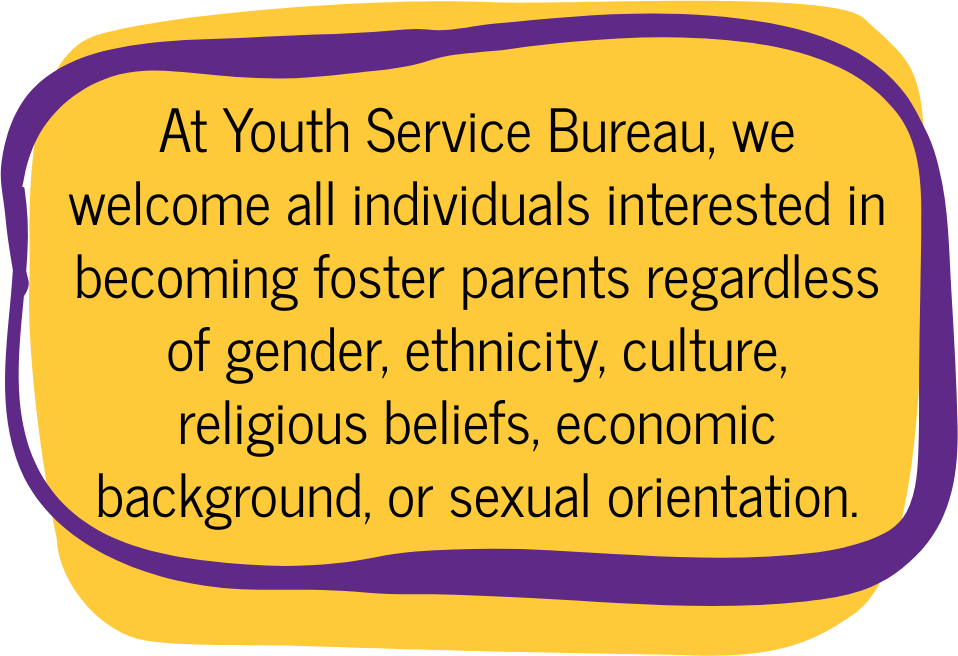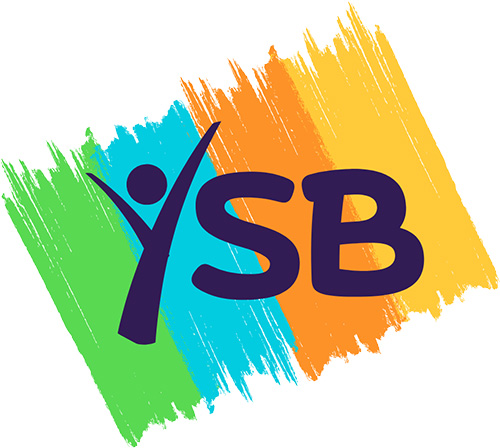Foster Care Program
Youth Service Bureau cares for children who have been removed from their home by the Illinois Department of Children and Family Services (DCFS) due to abuse and/or neglect. When DCFS determines that a child is not able to remain safely in their home YSB places them with caring foster families.
Throughout the process, YSB caseworkers provide support to the child, the foster family, and the biological parents.
Foster parents play a vital role in providing stability, support, and care for children and teens in foster care. Below is more information to help you decide if fostering is right for you. If you have further questions you can contact our team at fostercare@ysbiv.org.

What types of Foster Care options are available?
What does it take to become a Foster Parent?
What support do Foster Parents receive?
How will my life change as a Foster Parent?
Foster Parent downloads & training resources
Foster placements can take several forms. The most well known is a traditional foster home. These placements can last between a few weeks and a few years, while the child’s family works to regain custody.
Some foster families choose to receive additional training and licensure to provide care for children with special behavioral or medical needs. YSB is the only private foster care provider in Illinois with a Registered Nurse on staff to support the children and families.
Emergency foster homes provide care for short periods of time (up to 21 days) while our family finding staff works to arrange a longer term solution.
Some families want to help but can’t provide care on a regular or ongoing basis. They become our Respite care homes. They go through the same training and licensing process for the safety of the children and then become an invaluable resource for other foster families that need a short break.
Becoming a caring foster parent means opening your heart and home to children of all ages, ethnic backgrounds, and identities, including those who identify as LGBTQ.
You’ll be responsible for meeting their basic needs, including providing food, clothing, shelter, and appropriate supervision. You’ll also ensure they get to school, medical appointments, therapy sessions, court hearings, and extracurricular activities.
As a foster parent, you’ll be part of a team working together to support each child’s well-being, and your willingness to collaborate with DCFS, teachers, therapists, and other service providers will make a meaningful difference in their lives.
Most importantly, you’ll offer a safe, inclusive environment where every child feels seen, respected, and valued.
Foster Parent Requirements
Foster parenting isn’t about being perfect. It’s about being present, consistent, and caring, even when it’s hard.
Who Can Be a Foster Parent?
- You must be 21 years or older.
- You can be single or married.
- You must be a stable, law abiding citizen.
- You may own or rent your home (landlord approval is required if renting).
- You must have sufficient financial resources to care for yourself, your family, and foster children.
- You must have a valid driver’s license and current auto insurance (or ensure another household member does).
Home Requirements
- Your home must be clean, orderly, and free of hazards (e.g., clutter, exposed wiring, broken windows).
- The foster child’s bedroom must have at least 40 square feet of space and room for their belongings. They may share a bedroom with another child.
- Smoking is not permitted in the home or in vehicles used to transport foster children.
- All dogs and cats (indoor and outdoor) must be current on rabies vaccinations.
Health & Background Checks
- Foster parents must complete a physical exam, TDAP and TB skin test.
- Children in the home must have physicals; school, age children may use their most recent school physical.
- All household members 18 and older must be fingerprinted.
- Youth ages 13–17 in the home must pass a DCFS background check.
Licensing & Training
- You’ll complete a screening process with our agency.
- You must attend and complete PRIDE pre-service training, YSB training, and CPR/First Aid Certification
- You must agree to ongoing supervision and comply with agency and DCFS standards.
Foster parenting is a significant commitment, but you won’t be doing it alone. Both the state and our agency provide a wide range of support to ensure you and your family feel equipped, encouraged, and cared for throughout the journey.
State, Supported Resources
- Monthly financial reimbursement to help cover the cost of the child’s basic needs (food, clothing, shelter).
- Medical, dental, and mental health coverage for the child, through Medicaid.
- Childcare assistance, especially for working foster parents.
- Training and licensure support, including pre, service and ongoing education.
- Legal support and advocacy for permanency planning and court processes.
Agency, Supported Resources
- Dedicated caseworker and licensing worker for ongoing guidance and support.
- Regular home visits and check, ins to address questions or concerns.
- Mental health and behavioral support for both the child and the foster parent.
- Help navigating school systems and advocating for educational services.
- Recognition events, family outings, and appreciation gifts to build community and show gratitude.
Opening your home to a child in foster care is life changing, for you and for them. While the experience is deeply meaningful, it’s also important to be prepared for what the journey may involve. Here’s what you can expect in the first days and weeks:
Emotional Ups and Downs
- Fear, sadness, and uncertainty are common. Children may have just left everything familiar – family, friends, school, even pets.
- Behavior may not match age. Some regress (bedwetting, tantrums), while others act overly mature or independent.
- The “honeymoon” phase is real. Children may seem quiet or well, behaved at first, but this can change as they begin to feel safe.
- Testing limits is a way for children to see if you’ll give up on them too, just as others may have.
Health and Learning Needs
- Children may arrive with unmet medical, dental, or developmental needs.
- Some have learning difficulties or school delays due to instability or trauma.
- Many experience food insecurity behaviors, such as hoarding or overeating.
Impact on Your Household
- Your daily routine will shift. Expect more structure, appointments, and supervision.
- Biological children may need support adjusting to the presence of a foster sibling.
- There may be strong emotions when a child leaves, even if the placement was temporary.
Teamwork and Time Commitment
- Be ready to work closely with caseworkers, therapists, teachers, and biological families.
- You’ll attend regular appointments and often will need to provide transportation.
- Ongoing training and paperwork are part of the process.
And Still… The Rewards Are Real
- You’ll witness growth, healing, and transformation—sometimes slowly, sometimes in big leaps.
- The love and security you provide can have a lifelong impact.
- Many foster parents say it’s the hardest and most meaningful thing they’ve ever done.
Resources
Documents & Links
- Foster Parent Law 2025 Implementation Plan
- Foster Parent Law Grievance Policy
- Foster Parent Law Grievance Form
- Foster Parent Handbook
- Part 402 – Licensing Standards for Foster Family Home
- Child Care Act of 1969
Trainings
Documents
- Foster Parent Confidentiality Training
- Foster Parent Appeal Process
- Behavior Support Management
- Sexual Harassment Policy
- Sexual Harassment Training
- Verbal De-escalation
- CPI De-escalation Tips
- De-escalate Anyone, Anywhere, Anytime
- Online Training Acknowledgement
Videos
Get started today! Become a Foster Parent.
Being a foster parent may be challenging, but the rewards are enormous. If you come with optimism and realistic expectations, Youth Service Bureau will support you with a team that guides you through the process and assists you in making a difference in the life of a child.
Fill out the form below and we’ll contact you with more information.

Have Questions?
If you have further questions you can contact our team at fostercare@ysbiv.org.
